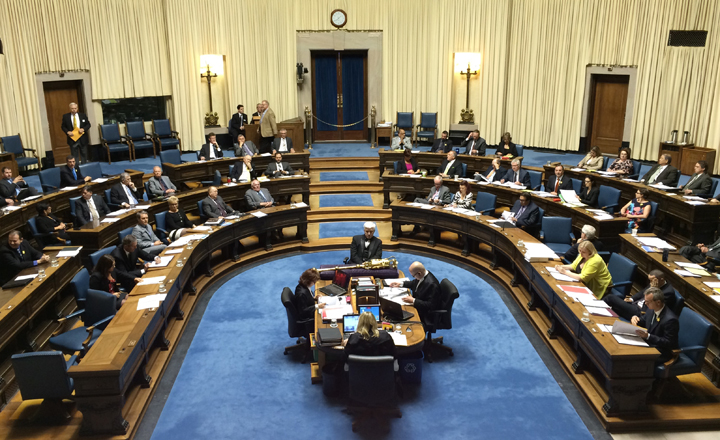WINNIPEG – Smokers and banks will pay more to help pay for Manitoba’s spending on infrastructure in a deficit budget that borrows heavily from a dwindling rainy-day fund.

The governing NDP has tabled a $15-billion budget that boosts tobacco taxes by $1 a carton and increases the capital tax on financial institutions to six per cent from five per cent.
The budget — which includes a $422-million deficit — also increases tax credits for the caregivers of vulnerable relatives at home and boosts rental assistance for welfare recipients by up to $271 a household.
“We made a decision to invest in infrastructure. We made a decision to invest in health care. We made a decision to invest in education,” Finance Minister Greg Dewar said Thursday.
“Other provinces have taken a different route.”
READ MORE: 8 highlights from the 2015 Manitoba budget
The budget draws $105 million from Manitoba’s rainy-day fund to pay down debt and support infrastructure spending. That leaves $115 million in a bank account that boasted $864 million in 2009.
That will be replenished at some point “as the economy grows,” said Dewar, a longtime backbencher who took over the portfolio last fall after a partial caucus revolt against Premier Greg Selinger.
The fiscal blueprint promises $1 billion in infrastructure spending as part of a five-year stimulus plan that was announced when the government raised the provincial sales tax in 2013.
The budget includes modest spending increases in health care and education. It records the latest in a string of deficits as the province delays balancing the books until 2019 — four years later than originally promised.
Dewar disagreed with Statistics Canada’s assessment that Manitoba’s economy grew by 1.1 per cent last year, saying the province is “on track to have the strongest economy in Canada.”
But that’s not enough to balance the books in the near future, he said.
“We’re starting to see good numbers now and we’re anticipating that we shall return to surplus as long as we continue to spend less than we do coming in.”
READ MORE: Who wins and who loses in the 2015 Manitoba budget?
The government has come under harsh criticism from the Progressive Conservatives for hiking taxes and not focusing aggressively enough on belt-tightening.
Thursday’s budget comes as the NDP tries to leave behind the turmoil caused by internal discontent that led to a leadership race in March which Selinger won by 33 votes. The premier’s top five cabinet ministers resigned last year after calling for his resignation in light of plummeting opinion polls following the provincial sales tax increase.



Comments